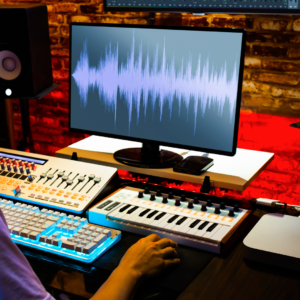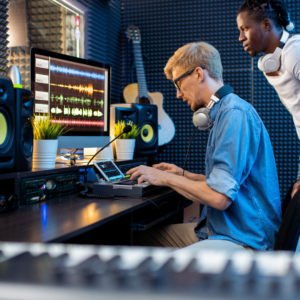Are you tired of having great song ideas but not knowing how to turn them into chart-topping hits? Look no further! In this blog post, we’ll delve into the art of music production and give you the tools you need to transform your musical concepts into successful compositions.
Whether you’re a seasoned producer or just starting, our tips and tricks will help guide you toward creating your hit songs. So let’s dive in and explore the world of music production together!
What is Music Production?
Music production creates music, from the initial idea to the final product. Whether you’re a musician hoping to make your tracks, or an audio engineer working on a project for a client, this guide will teach you the basics of music production.
To produce great songs, you need to have an understanding of both music theory and audio engineering. Music theory studies how music works structurally, while audio engineering focuses on the technical aspects of producing sound. Both are important, but don’t worry if you don’t have all the answers right away-the most crucial part is getting started.
How to Write a Song
- Start with an idea – Before writing any lyrics or melodies, ensure you know what you want the song to say or sound like. This can be anything from a single line of inspiration to a complete story or scene. Once you have your idea, start sketching a rough outline of what the song will look like.
- Get organized – Once you have your idea, it’s time to start typing your thoughts into more specific ideas and scenes. Try breaking down the song into smaller parts, so each section has its focus and direction. This will help keep everything flowing smoothly once you start working on the lyrics and melodies.
- Start with verse/chorus structure – Almost all songs follow some verse/chorus structure. This allows the song to flow smoothly and gives it a focal point. Ensure you understand your song’s basic design before working on the lyrics and melodies.
- Write down everything – Even if you’re not planning on putting your song into proper form, it’s still a good idea to write down everything that comes to mind while working on it. This will help jog your memory later on and make revisions easier.
- Think melody first – It might seem counterintuitive, but the best song ideas often come before the lyrics do. Start with something simple like an acoustic guitar or piano ballad, and then develop the melody around that framework. Don’t be afraid to experiment sometimes; the best song ideas come when you’re not thinking about anything in particular!
- Be patient – Writing a great song can take a lot of effort, but don’t be discouraged if it takes some time to get started. Some songs take months or even years to come together, so don’t rush things just because you want your song to be finished as quickly
Recording Studios
Creating a hit song is usually quite simple, but it takes a lot of skill and experience to produce great music that catches the listener’s attention. To create great music, you need to understand how sound works well. You also need to have a solid working knowledge of recording studios and how they can be used to produce the perfect sound for your songs.
It would be best if you found a sound recording studio to start producing your music. There are many different types of studios, so you must select the one that best suits your needs. Some popular kinds of studios include:
- A professional recording studio where artists will typically record an album or make video recordings;
- A home studio where musicians can record their music;
- A vocal booth where singers can record vocals without being seen by other people;
- An audio engineering studio where professionals will mix and master recordings.
Once you have found the proper recording studio, it’s time to start planning your project. First, you should develop some ideas for the songs you want to make. Once you have some ideas, it’s time to start putting them into words.
After you have written down your thoughts, it’s time to start recording them onto tape or digital media. When registering your songs, it’s essential to use quality equipment and microphones that will
Audio Editing Software
- Adobe Audition: Adobe Audition is a powerful audio editing software used by professional musicians and sound engineers for years. It has an intuitive user interface features many advanced tools for cutting, splicing, and mixing audio files.
- Logic Pro X: Logic Pro X is a powerful audio editing software from Apple Inc. It offers an intuitive user interface and many advanced tools for cutting, splicing, and mixing audio files.
- Reaper: Reaper is a popular open-source audio editing software that professional musicians and sound engineers worldwide use. It has an easy-to-use user interface that features many advanced tools for cutting, splicing, and mixing audio files.
- Cubase SX: Cubase SX is a powerhouse digital recording studio from Steinberg that offers a wide range of features for music production, including powerful audio editing tools like Reaquirer, which allows you to easily cut, splice, mix, edit tags, etc. in your music files without ever leaving the main window of Cubase SX.
- Sonar X3: Sonar X3 is a professional audio editing software from Steinberg that offers an intuitive user interface and many advanced tools for cutting, splicing, and mixing audio files.
Promotion and Marketing
There are many ways to promote and market your music, but the most important thing is to have a good product. You can use online platforms like YouTube, SoundCloud, and Spotify to get your music out to a broader audience.
You can also use traditional marketing techniques like advertising, word-of-mouth, and viral content marketing. Whatever route you choose, make sure you are constantly promoting your music and improving your skills to keep up with the competition.





